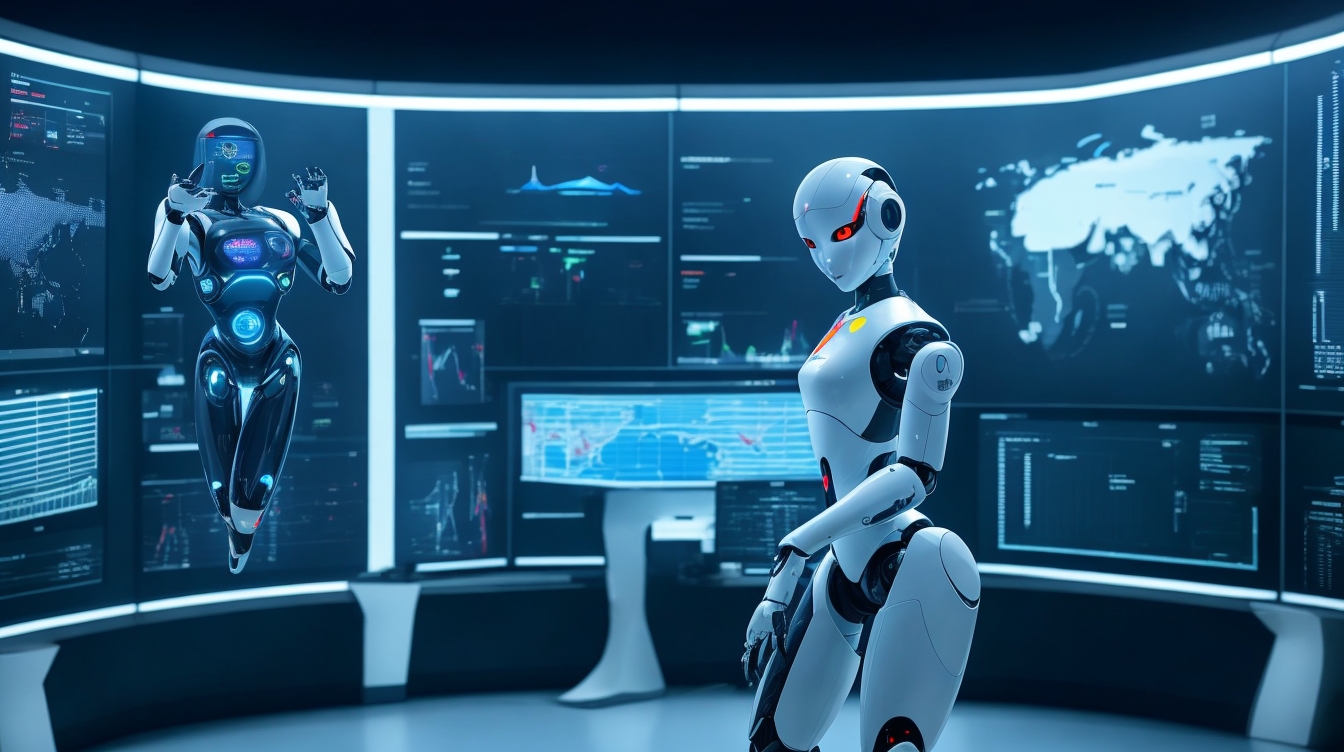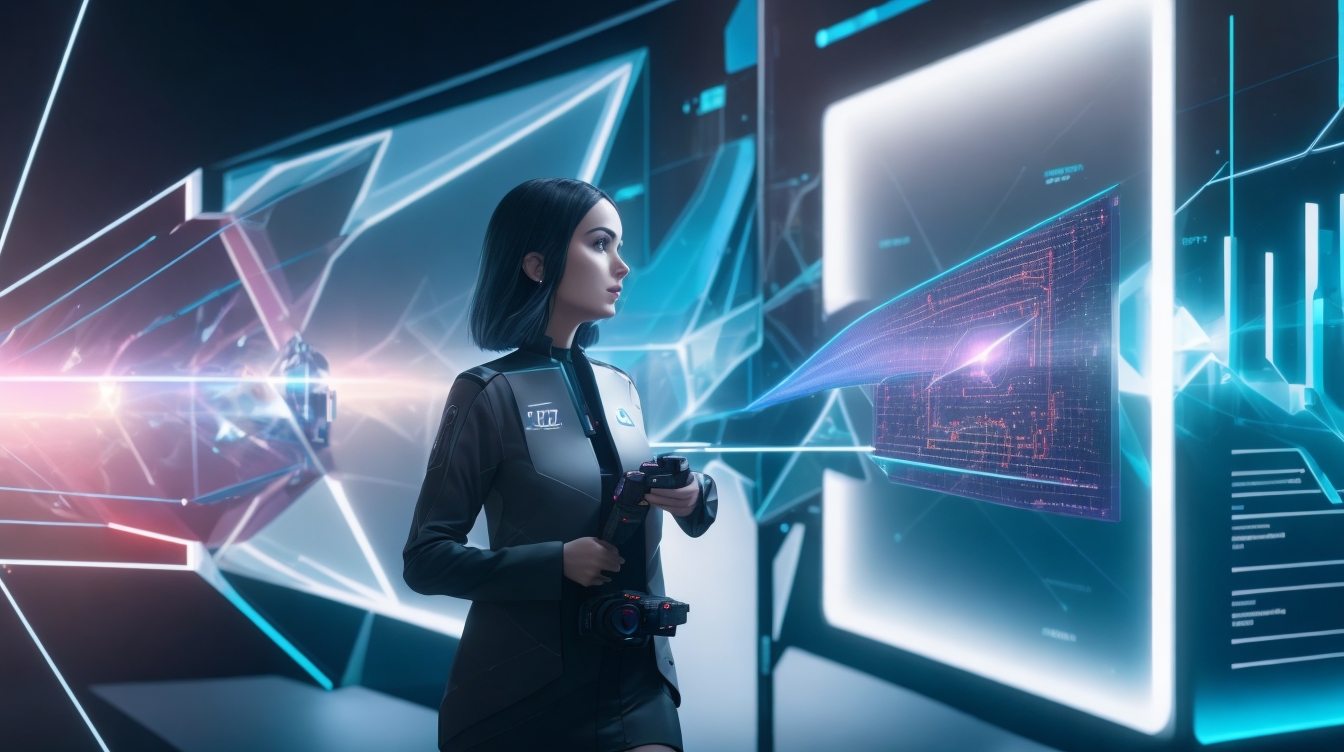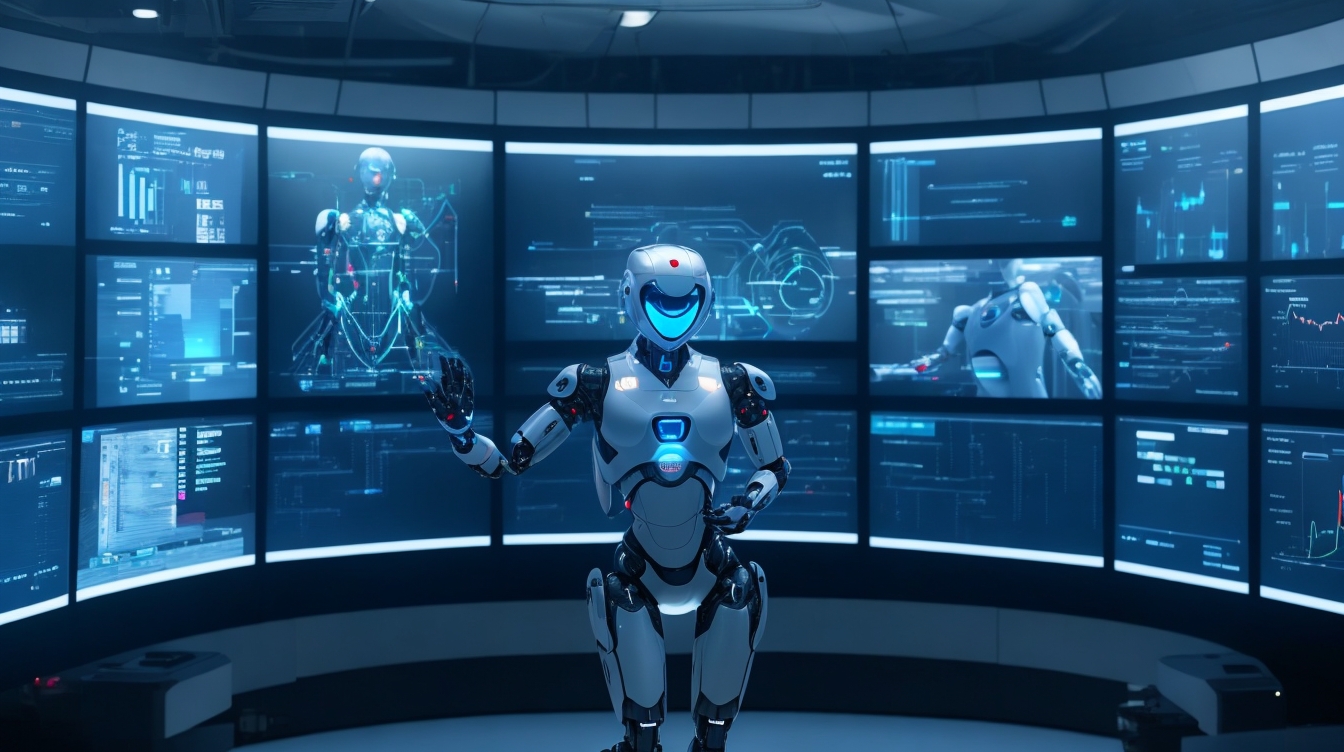In recent years, the use of artificial intelligence (AI) in content creation has revolutionised the world of digital marketing. As brands recognise the importance of high-quality content in attracting and retaining customers, the integration of AI tools in the content creation process has become increasingly prominent. This article will take you on a journey through the world of AI for quality content creation, exploring its impact, tools, and future implications.
Understanding AI for Content Creation: AI in content creation refers to the utilisation of machine learning algorithms, natural language processing, and other AI technologies to generate various forms of content. These advanced tools can automatically create written, visual, and audio content at an incomparable speed, often matching or exceeding human-generated content in terms of quality.
The Mechanics of AI Content Creation: AI content creation tools utilise vast databases and robust machine learning models to analyse patterns within existing content, allowing them to quickly generate fresh content imbued with the nuanced understanding of language and context. By employing NLP and semantic analysis techniques, AI tools can ensure that content is both engaging and relevant to the target audience.
The Impact of AI on Content Quality
AI has steadily transformed the creative landscape, enabling users to generate higher quality content in a shorter timeframe. Let's delve deeper into how AI enhances content quality.
AI-driven Improvements in Content Quality
-
Reduced Human Error: AI tools are designed to minimise grammatical errors, inconsistencies, and other mistakes, ultimately creating content that is far more polished and professional.
-
Efficiency and Speed: With AI, creators can produce high-quality content at an unprecedented rate, freeing up time for ideation and other creative pursuits.
-
Data-driven Insights: AI can analyse vast amounts of data to generate content that is optimised for search engines. This ensures that the content is both well-targeted and strategically crafted to achieve specific marketing goals.
Exploring AI Content Creation Tools
AI tools have proliferated to cater to the growing demand for quality content. Here are some top contenders in the AI content creation sphere.
Jasper is an AI writing assistant that helps users craft engaging blog posts, ad copy, emails, and more. With a intuitive platform and top-class natural language generation capabilities, Jasper allows users to generate high-quality content in a matter of minutes.
HubSpot is a marketing software that encompasses AI-powered features like content strategy tools, keyword suggestions, and topic clustering. Its intelligent algorithms help marketers create SEO-optimised content that targets specific audiences and achieves their objectives.
Frase is an AI-driven platform that allows users to create, optimise, and improve their content. Designed to be user-friendly and versatile, Frase streamlines content research, automatically generates outlines, and provides suggestions for enhancing the overall quality of your content.
Grammarly A household name in AI content creation, Grammarly is an advanced writing assistant designed to catch errors and help writers improve their work. It provides real-time feedback, including suggestions on grammar, punctuation, style, and semantics, ensuring that content is polished and effective.
Synthesia is an AI video production platform, enabling users to create visual content with ease. By leveraging cutting-edge deep learning techniques, Synthesia allows users to build realistic, dynamic videos without the need for complicated editing software or hours of manual work.
MarketMuse is an AI-driven content strategy and planning tool that helps marketers create content that resonates with their audience. By offering insights on audience segments, keyword opportunities, and content gaps, MarketMuse helps users create content that is engaging, SEO-optimised, and ripe for success.

The Role of AI in Different Content Types
AI has left an indelible mark on various forms of content creation.
AI in Written Content Creation: In the realm of written content, AI tools have proven invaluable in streamlining the writing process and enhancing output quality. From error-free copy to data-driven insights on SEO strategies, AI has become an indispensable component of written content creation.
AI in Visual Content Creation: AI tools are also reshaping the visual content creation space as they facilitate the generation of complex graphics, illustrations, and even films at a rapid pace. In particular, AI-driven video production platforms have emerged as game-changers within the industry.
AI in Audio Content Creation: AI's impact on audio content is equally significant, with tools like voice assistants, text-to-speech engines, and AI-powered music composition propelling the evolution of podcasts, audiobooks, and other audio-centric content.
The Future of AI in Content Creation
AI's trajectory in content creation is expected to surge in the coming years. As technology advances and competition intensifies, content creators will increasingly rely on AI tools to generate exceptional content that captivates readers and drives results.
Predictions and Trends
-
AI-Generated Content: As AI technology develops, we can expect AI-generated content to become indistinguishable from human-generated content, boosting both efficiency and quality.
-
AI Collaborators: The future will likely see AI tools functioning as creative collaborators, working alongside human creators to develop content that combines the best of machine intelligence and human ingenuity.
-
Tailored Content: With AI's ability to analyse enormous data sets and identify patterns, the era of personalised content that caters to each individual's preferences is on the horizon.
Ethical and Legal Considerations: There are, however, concerns surrounding the ethics and legality of AI-generated content. As we move towards an AI-saturated creative landscape, it becomes crucial to consider issues of authorship, ownership, and authenticity, addressing the potential implications before they morph into insurmountable challenges.
Conclusion
AI has indisputably become a catalyst for the production of high-quality content across diverse digital channels. By leveraging AI tools and embracing the transformative power of this technology, content creators can elevate their work, maximise efficiency, and stay ahead of the ever-evolving curve. So, dive into the exciting realm of AI for quality content creation, adopt the tools that suit your needs, and watch your creative prowess soar.

Detailed Comparison of AI-generated Content vs Human-generated Content
As the popularity of AI-generated content increases, it is crucial to understand the differences and benefits it brings when compared to traditional human-generated content.
1. Efficiency and Speed: AI-generated content can be produced rapidly, often taking mere seconds to produce a polished piece of writing. In contrast, human content creation tends to be more time-consuming due to the manual research and editing required.
2. Consistency: AI tools are programmed to adhere to specific stylistic guidelines and rules, ensuring consistent and error-free output. Human-generated content may be more prone to inconsistencies and mistakes, particularly when multiple authors are involved.
3. Availability: Unlike humans, AI tools can work around the clock, providing an unparalleled level of availability. This can be invaluable for businesses aiming to maintain a constant stream of new content or for those requiring immediate content delivery.
4. Analysis and Data-Driven Content: AI-generated content is often backed by extensive data analysis, enabling businesses to tailor content to specific audiences and optimise it for search engines. While humans can also conduct research and analyses, AI tools tend to be far more efficient and comprehensive.
5. Creativity and Originality: Human-generated content still holds an advantage when it comes to creativity, as AI tools may struggle with more abstract concepts, storytelling, and emotional appeal. AI-generated content can sometimes come across as formulaic, lacking the unique touch that a human creator can provide.
The Role of AI in SEO Optimization
AI plays a pivotal role in shaping modern SEO strategies. Here are some areas in which AI contributes to content optimisation:
1. Keyword Research: AI tools can analyse vast data sets to identify high-volume and low-competition keywords, ensuring that content is optimised for search engines and captures the right audience.
2. Semantic Analysis: AI algorithms can go beyond simple keyword matching to understand the context and relevance of content, leading to more sophisticated strategies for targeting specific search intents and serving the most relevant content.
3. Competitive Analysis: AI-powered platforms can monitor and analyse competitors' content, enabling businesses to identify gaps and opportunities to outperform them in search rankings.
4. Content Optimisation: AI tools can provide insights and suggestions to enhance the structure, readability, and SEO potential of content, ensuring maximum visibility and engagement.
5. Personalisation and User Experience: With AI-driven personalisation techniques, businesses can tailor content and user experience to individual users, fostering higher engagement and better search rankings.

The Process of Training AI Models for Content Creation
The training of AI models for content creation follows a series of steps:
1. Data Collection: AI models require a vast collection of relevant and high-quality data to analyse and learn from, typically gathered from diverse and reliable sources.
2. Data Pre-processing: Raw data is cleaned, organised, and prepared for the AI algorithm to process. This can include text tokenisation, removal of stop words, and data normalisation.
3. Feature Extraction: AI tools convert raw data into informative features that the algorithm can interpret. In the case of natural language processing, this might involve creating n-grams or word embeddings.
4. Model Building: Appropriate machine learning models, such as deep learning neural networks or decision trees, are selected and trained to predict and generate content based on the processed data features.
5. Evaluation: Models are continually evaluated and fine-tuned using validation datasets, ensuring that the AI-generated content remains relevant, accurate, and engaging.
6. Deployment: Once the AI model is properly trained and tested, it is integrated into content creation platforms for users to access and make use of.
Personalisation of Content Using AI
AI-driven personalisation enables businesses to create tailored content and experiences, targeting individual users' preferences and behaviours. Here are some key strategies for content personalisation:
1. Behavioural Analysis: By analysing users' browsing habits, content consumption patterns, and interaction data, AI tools can identify preferences and serve personalised content to each user.
2. Demographic Targeting: AI can use demographic data, such as age, gender, and location, to generate content that resonates with a specific audience group.
3. Dynamic Content Generation: AI can enable the automatic generation and delivery of bespoke content based on an individual's preferences or unique contexts, fostering engagement and loyalty.
4. Personalised Recommendations: AI algorithms can recommend content, products, or services tailored to a user's interests, increasing the likelihood of conversions and boosting revenue.
5. Omnichannel Personalisation: AI-driven personalisation can extend beyond content to customise user experiences across multiple platforms, such as email, social media, and chatbots.

Limitations and Challenges of AI in Content Creation
Despite its transformative power, AI in content creation also faces limitations and challenges:
1. Creativity and Originality: AI-generated content can sometimes lack the unique flair and emotional connection that human-generated content can provide, leading to formulaic content that may not stand out.
2. Ethical and Legal Concerns: Intellectual property, copyright, and data privacy are crucial concerns when using AI-generated content. Balancing technological benefits with ethical considerations is an ongoing challenge.
3. Limited Understanding of Context and Nuance: While AI is rapidly improving, it may still struggle to discern subtleties in context, cultural nuances, and irony, potentially leading to misunderstandings or mistakes.
4. Overreliance on AI: The ease and efficiency of AI-generated content may tempt businesses to become overly dependent on technology, potentially undermining the importance of human creativity and insight.
5. Trust and Authenticity: As AI-generated content becomes increasingly sophisticated, it can be challenging to discern between human and machine-generated output, raising questions of trust and authenticity in the digital realm.

Using AI Automation Agency Services for Content Creation
AI automation agency services have emerged as powerful solutions for businesses seeking to streamline their content creation processes and generate high-quality, engaging content across various platforms. By harnessing the power of AI-driven tools and platforms, these services facilitate the creation of authority websites, social media posts, feature images, and AI-driven apps.
AI Automation for Authority Websites
Authority websites establish a strong online presence by offering high-quality, relevant, and informative content that caters to their target audience's needs. AI automation agency services can help build such websites by:
-
SEO-Optimized Content: Utilising AI-driven SEO tools to research and incorporate relevant keywords, ensuring high search engine rankings and visitor engagement.
-
Quality Assurance: Employing AI-based editing and proofreading tools, like Grammarly, to refine content and maintain a consistent style and tone that represents the brand's values and expertise.
-
Data-Driven Insights: Using AI analytics to monitor website performance, identify content gaps, and optimise strategies, ensuring the website remains relevant and authoritative.
-
Personalisation: Implementing AI-powered personalisation techniques to tailor content and user experiences to individual preferences, promoting higher engagement and loyalty among visitors.
AI Automation for Social Media Posts
AI-driven social media automation tools help businesses create and manage highly engaging social media posts that resonate with their audience. Some key aspects of AI-driven social media strategies include:
-
Content Generation: Using AI-powered content creation tools to develop compelling and relevant social media posts that drive engagement.
-
Post Scheduling: Leveraging AI algorithms to identify optimal posting times based on audience engagement, ensuring content reaches users when they are most likely to interact with it.
-
Performance Analysis: Deploying AI analytics to monitor post performance, identifying successful content types, and adjusting strategies to maximise reach and engagement.
-
Targeting and Ad Campaigns: Implementing AI-driven advertising and targeting tools to reach potential customers and increase conversion rates for promotional campaigns.
AI Automation for Feature Images
Feature images play a crucial role in grabbing users' attention and complementing written content. AI automation agency services help businesses create stunning visuals that stand out through:
-
AI-Generated Graphics: Using AI platforms like DeepArt and RunwayML to generate unique and high-quality visual content tailored to specific themes and styles.
-
Photo Enhancement: Employing AI-driven photo editing tools, like letsenhance.io, to refine and improve image quality, ensuring every image meets the highest standards.
-
Personalisation: Utilising AI techniques to personalise images based on user preferences or demographics, enhancing user experiences and fostering engagement.
-
Smart Image Optimization: Implementing AI-driven image compression tools, like JPEGmini, to reduce load times while maintaining image quality, ensuring a smooth browsing experience.
AI Automation for AI-Driven Apps
AI-driven apps have surged in popularity as they offer intuitive, personalized, and dynamic experiences for users. AI automation agency services can assist in the development of such apps by:
-
Natural Language Processing: Integrating NLP and semantic analysis technologies to facilitate human-like interactions with users through text or voice input.
-
AI-Model Development: Building custom AI models tailored to specific app requirements, ensuring robust capabilities and seamless performance.
-
User Experience Design: Leveraging machine learning algorithms to analyse user behaviour and create intuitively designed experiences that cater to their needs and preferences.
-
Real-Time Analytics and Insights: Monitoring app performance in real-time and using AI-driven insights to optimise user engagement, conversion rates, and overall experience.
Working with AI automation agency services, businesses can harness the full potential of AI-driven tools and empower their content creation strategies, ensuring they stay ahead of the competition in the ever-evolving digital landscape.

FAQs
How does AI-generated content compare to human-generated content in terms of quality and efficiency?
AI-generated content offers several advantages, including increased efficiency, speed, and consistency. However, it may lack the creative and emotional touch that human creators can provide. Despite this, AI-generated content continues to improve and is becoming increasingly competitive with human-generated content.
In what ways does AI influence SEO optimization?
AI plays a significant role in various aspects of SEO optimization, from keyword research and semantic analysis to content personalisation and monitoring competitor strategies. It ensures that the content is both well-targeted and tailored to specific audiences, ultimately enhancing search engine rankings and reach.
How are AI models trained for content creation?
Training AI models for content creation involves collecting and pre-processing vast amounts of data, extracting relevant features, and selecting appropriate machine learning models. These models are then trained and evaluated using multiple iterations until they can generate accurate and engaging content.
Can AI tools help with content personalisation?
Yes, AI tools can enable businesses to personalise their content and user experiences by analysing user behaviour, demographic information, and preferences. This fosters higher engagement and loyalty among users, helping businesses drive growth and success.
What are the limitations and challenges of using AI in content creation?
AI in content creation faces limitations and challenges such as achieving the same level of creativity and originality as human-generated content, addressing ethical and legal concerns, understanding context and nuances, avoiding overreliance on AI, and ensuring trust and authenticity in AI-generated content.


